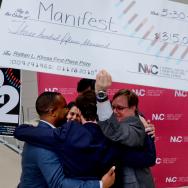When Yang Zheng decided to go to business school, he knew he wanted to be an entrepreneur. Instead of launching his own mobile application or consumer product, he sought an opportunity to join up with a University of Chicago doctor and begin work on bringing a technology to market that will change people’s lives.
An MBA student at Chicago Booth, Zheng is the chief operating officer of Oxalo Therapeutics, a biotechnology company that is developing a novel drug to prevent kidney stones. Oxalo is the latest in a series of research innovations that, with the help of the Polsky Center for Entrepreneurship and Innovation, is moving from the lab to making impact in the real world.
Oxalo’s drug is based on research conducted by Hatim Hassan, a UChicago assistant professor of medicine, who studies the gut microbe that exists in some people that helps prevent kidney stones. This microbe, found in around 60 percent of people, releases factors that stimulate the intestines to remove oxalate, the toxic molecule that, when combined with calcium, causes most kidney stones. By creating a drug that mimics the factors that this bug releases, the drug aims to remove oxalate in the body and prevent kidney stones. This type of microbiome-inspired therapy is sometimes referred to as “drugs as bugs.”
On May 22, Oxalo Therapeutics will find out if it is one of the teams selected to compete in the nationally renowned Edward L. Kaplan, ’71, New Venture Challenge, in which companies present to a panel of esteemed entrepreneurs and investors.
Getting involved
Zheng got involved with the Polsky Center through programs like the Collaboratorium, which connects University scientists and researchers with business students, and the Technology Venture Fellows program. While working as an intern in the Polsky Center’s technology commercialization office, Zheng decided he was ready to take his business expertise and join a company that could make an impact.
“My criteria for whatever business I joined or started was that it would make dramatic impact in people’s lives, and in reviewing these University technologies, it seemed like biotech was the way to do that,” said Zheng. “I wanted to focus on one technology that had good potential and a good cofounder, and at the same time, Hassan’s technology was just mature enough where it was ready to be commercialized. And the Polsky Center, knowing both of our paths and our goals for the future, connected us.”
“I was impressed with Yang’s commitment to the biotech entrepreneurship path,” said Matt Martin, microbiome innovation and ventures lead at the Polsky Center. “While Yang and I had been informally talking for a few months, he described his commitment at a time when I was looking for another person to join Hassan’s business team. It turned out to be a perfect fit.”
Zheng connected with Hassan, and they took Oxalo through the UChicago Innovation Fund in the fall of 2017, receiving $250,000 from the Polsky Center. The Innovation Fund provides funding to UChicago-affiliated ventures and technologies that have the greatest promise to benefit society. The Innovation Fund fills a critical gap in venture funding, providing early capital that is often unavailable, but is needed to help bring groundbreaking ideas to market. Oxalo also benefited from the UCGo! Startup License, a program that streamlines and simplifies the licensing process for University startup companies, shortening the timeline and minimizing the company’s legal costs.
Following the Innovation Fund, Oxalo prepared for the next step in their entrepreneurial journey: the Polsky Center’s capstone program, the New Venture Challenge.
The NVC experience
Zheng is leading Oxalo through the New Venture Challenge, which requires a UChicago graduate student as an integral part of the team. Oxalo was accepted to Phase II of the NVC in February and is now in the middle of the rigorous classroom portion—complete with mentoring, critical feedback from outside judges and investors, and business plan development.
The classroom portion of the New Venture Challenge calls for students to present their companies to the class and a rotating group of outside judges and investors multiple times throughout the quarter. A process that Zheng contends is about much more than just crafting the perfect pitch.
“Going through the process of forcing yourself to tell the story of your company to people that may or may not care, or may or may not be in your industry, is the most powerful tool of the NVC,” said Zheng. “You intimately know your business, so you get to the point where you can explain it in a million different ways for a million different audiences. If you don’t know your business to that level, you need to. And that’s what the NVC has forced us to do.”
While the New Venture Challenge has a 22-year history, it is only recently that the University’s venture creation and technology licensing operations were brought under one organization. The recent expansion of the Polsky Center has made companies such as Oxalo—the product of University research—even more common. While there might be a vast difference between companies such as Oxalo or past NVC winners Grubhub or Tovala, the program is designed to benefit companies, no matter their industry or background.
“Ultimately, everything is a business. It doesn’t matter if you are a new type of food or science or a mobile app, it’s a business,” said Zheng. “You need to tell a story and figure out your finances and operations and everything like that. The NVC forces you to do that, and to do it well.”
At the NVC finals, teams will compete for a comprehensive awards package totaling more than $1 million in prize and in-kind services. This year, as a result of a recent gift from Chicago Booth alum Rattan Khosa, MBA ’79, the first-place prize will be a record $150,000.
Following the New Venture Challenge, Oxalo is planning to spend the next few months fundraising and participating in additional accelerator programs to continue to build and grow their business.
“They’re at the beginning of what could be a long, 10-year journey to bring a new class of drug to market,” said Martin. “However, kidney stone prevention is a huge unmet need for those with recurrent stones, and this team is off to a great start. I’m confident that if anyone can turn this science into a new therapy, Yang and Hassan will.”

